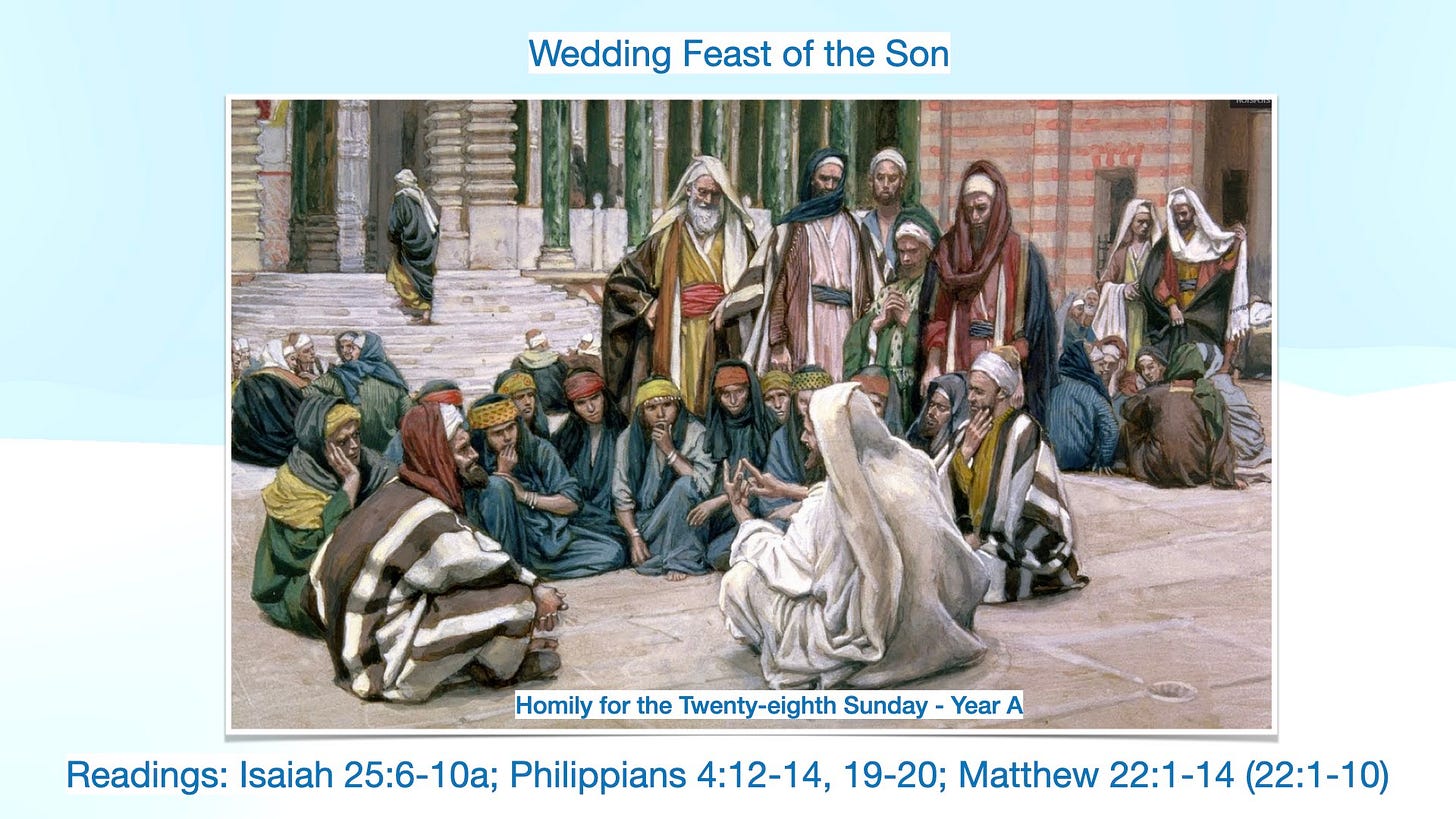Prophet Isaiah announces a time of universal salvation when the nations will go up to "the mountain of the Lord" (Is. 2:2-3) and find a feast prepared for them there by God (Is. 5:6). It will be a wedding feast (Matt. 22:2) of the Son of the Father - the Lamb of God and His Bride - the Church (Rev. 21:9). The invitations had been sent, first to Israel (Matt. 22:3) and then to the Gentiles (Matt. 22:9-10; Acts 13:46). "Blessed are those who are invited to the marriage supper of the Lamb" (Rev. 19:9).
The first word of the Book of Psalms is "blessed" (Ps. 1:1) and the last one is "alleluia" (Ps. 150:1). Unfortunately, those first invited to the feast could not find the time to experience that blessing and sing "alleluia" to the Lamb (Rev. 19:6-7). The king repeated the invitation twice (Matt. 22:3-4), but the matters of this world were more important than participation in the wedding feast of the Son of God.
Some disregarded the king's invitation, "while the rest seized his servants, treated them shamefully, and killed them" (Matt. 22:6). How could the invitation, "come to the feast", cause such a reaction? Because the one who invites is God, and the invitation contains a call to conversion: “set your minds on things that are above, not on things that are on earth" (Col. 3:2)? Disregarding the invitation to the royal feast and killing the king's servants is tantamount to rejecting God's reign. We can see here the foreshadowing of the militant atheism of our time.
"The king was angry, and he sent his troops and destroyed those murderers and burned their city"(Matt. 22:7). This verse can refer to the destruction of Jerusalem by the Romans in AD 70, but as part of the parable, it teaches us about the consequences of our actions. In Luke this parable ends less dramatically, "none of those men who were invited shall taste my banquet" (Luke 14:24), but it contains the same message. By excluding ourselves from the feast of the Lamb, we lose ourselves for eternity (see CCC, 1033-1037).
The feast is ready, the wedding hall is filled with guests, "both bad and good" (Matt. 22:10), "for all have sinned and fall short of the glory of God, and are justified by his grace as a gift, through the redemption that is in Christ Jesus" (Rom. 3:23-24). But among the guests, there is someone not properly dressed for such an occasion (Matt. 22:11-12). This man did not take off the garment of "the old man with its practices" (Col. 3:9) to put on the garment of "the new man, created according to God's image, in righteousness and holiness of truth" (Eph. 4:24). Therefore, like Judas, who participated in the Last Supper, he ended up in darkness (Matt. 22:13; John 13:30).
"The king came in to see the guests" (Matt. 22:11). The Greek verb often translated as "to see" means to look attentively, to contemplate. What does God want to discover as He walks among us who participate in the Eucharist? To what extent have we become similar to the image of his Son! "I can do all things in him who strengthens me" (Phil. 4:13). To suffer poverty or live in abundance, to be imprisoned or free, to preach the Gospel or die for Christ. But by myself, without His grace, I can do nothing (CCC 1460).
"You set a table for me in the sight of my enemies" (Ps. 23:5). When on Holy Thursday on Mount Zion Jesus sat with his disciples to the Passover meal, none of its participants thought that the Eucharist "anticipates the wedding feast of the Lamb in the heavenly Jerusalem" (CCC 1329; Rev. 19:9): "I will not drink again of this fruit of the vine until that day when I drink it new with you in my Father's kingdom"(Matt. 26:29). Celebrating the Eucharist, we look forward to that day when death will be defeated and God will wipe away “the tears from every face” (Is. 25:8; Rev. 21:4).




